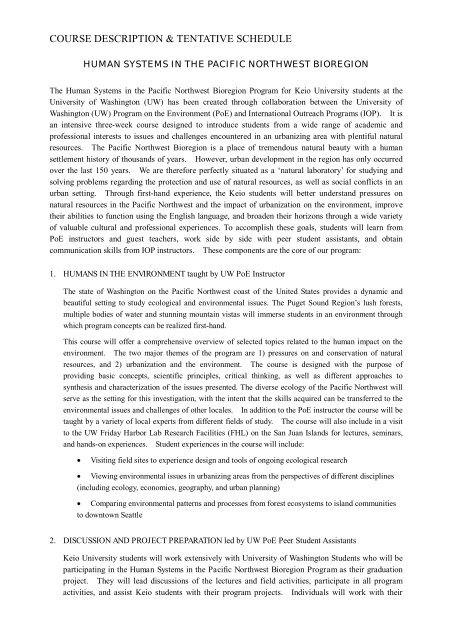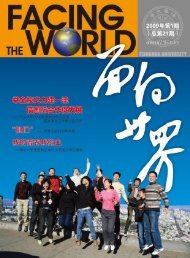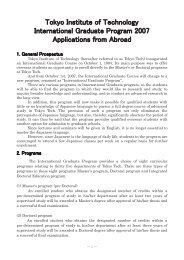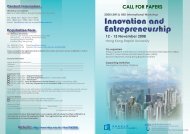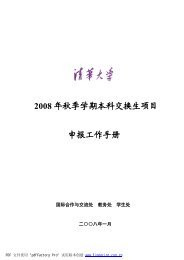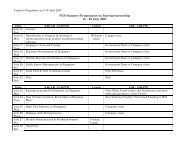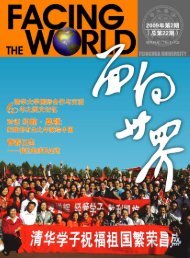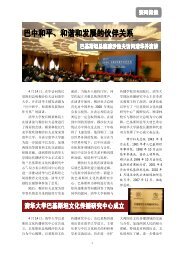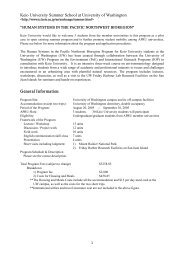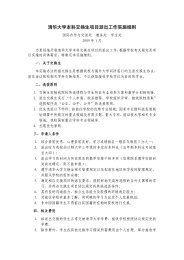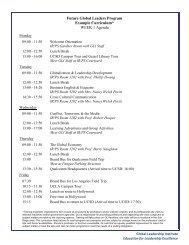COURSE DESCRIPTION & TENTATIVE SCHEDULE
COURSE DESCRIPTION & TENTATIVE SCHEDULE
COURSE DESCRIPTION & TENTATIVE SCHEDULE
Create successful ePaper yourself
Turn your PDF publications into a flip-book with our unique Google optimized e-Paper software.
<strong>COURSE</strong> <strong>DESCRIPTION</strong> & <strong>TENTATIVE</strong> <strong>SCHEDULE</strong><br />
HUMAN SYSTEMS IN THE PACIFIC NORTHWEST BIOREGION<br />
The Human Systems in the Pacific Northwest Bioregion Program for Keio University students at the<br />
University of Washington (UW) has been created through collaboration between the University of<br />
Washington (UW) Program on the Environment (PoE) and International Outreach Programs (IOP). It is<br />
an intensive three-week course designed to introduce students from a wide range of academic and<br />
professional interests to issues and challenges encountered in an urbanizing area with plentiful natural<br />
resources. The Pacific Northwest Bioregion is a place of tremendous natural beauty with a human<br />
settlement history of thousands of years. However, urban development in the region has only occurred<br />
over the last 150 years. We are therefore perfectly situated as a ‘natural laboratory’ for studying and<br />
solving problems regarding the protection and use of natural resources, as well as social conflicts in an<br />
urban setting. Through first-hand experience, the Keio students will better understand pressures on<br />
natural resources in the Pacific Northwest and the impact of urbanization on the environment, improve<br />
their abilities to function using the English language, and broaden their horizons through a wide variety<br />
of valuable cultural and professional experiences. To accomplish these goals, students will learn from<br />
PoE instructors and guest teachers, work side by side with peer student assistants, and obtain<br />
communication skills from IOP instructors. These components are the core of our program:<br />
1. HUMANS IN THE ENVIRONMENT taught by UW PoE Instructor<br />
The state of Washington on the Pacific Northwest coast of the United States provides a dynamic and<br />
beautiful setting to study ecological and environmental issues. The Puget Sound Region’s lush forests,<br />
multiple bodies of water and stunning mountain vistas will immerse students in an environment through<br />
which program concepts can be realized first-hand.<br />
This course will offer a comprehensive overview of selected topics related to the human impact on the<br />
environment. The two major themes of the program are 1) pressures on and conservation of natural<br />
resources, and 2) urbanization and the environment. The course is designed with the purpose of<br />
providing basic concepts, scientific principles, critical thinking, as well as different approaches to<br />
synthesis and characterization of the issues presented. The diverse ecology of the Pacific Northwest will<br />
serve as the setting for this investigation, with the intent that the skills acquired can be transferred to the<br />
environmental issues and challenges of other locales. In addition to the PoE instructor the course will be<br />
taught by a variety of local experts from different fields of study. The course will also include in a visit<br />
to the UW Friday Harbor Lab Research Facilities (FHL) on the San Juan Islands for lectures, seminars,<br />
and hands-on experiences. Student experiences in the course will include:<br />
<br />
Visiting field sites to experience design and tools of ongoing ecological research<br />
Viewing environmental issues in urbanizing areas from the perspectives of different disciplines<br />
(including ecology, economics, geography, and urban planning)<br />
Comparing environmental patterns and processes from forest ecosystems to island communities<br />
to downtown Seattle<br />
2. DISCUSSION AND PROJECT PREPARATION led by UW PoE Peer Student Assistants<br />
Keio University students will work extensively with University of Washington Students who will be<br />
participating in the Human Systems in the Pacific Northwest Bioregion Program as their graduation<br />
project. They will lead discussions of the lectures and field activities, participate in all program<br />
activities, and assist Keio students with their program projects. Individuals will work with their
Keio and UW peers to develop their projects on specific topics related to overarching themes and<br />
will have the opportunity to present their research to the larger group.<br />
3. COMMUNICATION SKILLS FOR HUMAN SYSTEMS IN THE PACIFIC NORTHWEST<br />
BIOREGION PROGRAM taught by UW English Language Specialist<br />
<br />
<br />
<br />
<br />
<br />
<br />
This course will include the following components:<br />
Analysis and discussion of journal and newspaper articles related to the course lectures<br />
Oral presentation skills<br />
Strategies for effective discussion leading<br />
Participation in question and answer sessions<br />
Conversational fluency practiced in professional and networking contexts<br />
Effective research skills for preparing the program final project<br />
WEEK ONE<br />
Day 1<br />
Saturday, August 20<br />
Day 2<br />
Sunday, August 21<br />
Day 3<br />
Monday, August 22<br />
<strong>TENTATIVE</strong> <strong>SCHEDULE</strong><br />
Keio Students Arrive in Seattle<br />
Transfer to the UW Research Facility at Pack Forest near Mount<br />
Rainier National Park<br />
Check into Pack Forest Cabins<br />
Program Orientation<br />
Introduction to Pacific Northwest ecology and environmental<br />
issues<br />
Ecology walk in Old Growth Forest<br />
Welcome Reception<br />
Elements of the Pacific Northwest Bioregion<br />
Class with Program on the Environment Professor<br />
Visit Mount Rainier National Park<br />
Field lecture with professor: Challenges of conservation of wild<br />
and pristine lands<br />
Afternoon lecture: Science, politics and public interest<br />
Pack Forest optional recreational activities<br />
What is Urban Ecology?<br />
Depart Pack Forest for University of Washington Campus<br />
Check into University of Washington Dormitories<br />
Class: Introduction to Urban Issues and environmental concerns<br />
Discussion and project preparation with UW Peer Assistants<br />
Day 4<br />
Tuesday, August 23<br />
Urban Ecology in the Puget Sound<br />
Communication skills for Humans in the Environment with<br />
English Language Specialist<br />
Workshop with Professor: Urban issues and environmental<br />
concerns<br />
Class with Professor: Urban issues and environmental concerns<br />
Discussion and project preparation with UW Peer Assistants<br />
Day 5<br />
Examining Cultural Diversity in the Pacific Northwest
Wednesday, August 24<br />
Day 6<br />
Thursday, August 25<br />
Day 7<br />
Friday, August 26<br />
Day 8<br />
Saturday, August 27<br />
Day 9<br />
Sunday, August 28<br />
WEEK TWO<br />
Day 10<br />
Monday, August 29<br />
Day 11<br />
Tuesday, August 30<br />
Day 12<br />
Wednesday, August 31<br />
Day 13<br />
Thursday, September1<br />
Day 14<br />
Communication skills for Humans in the Environment with<br />
English Language Specialist<br />
Workshop with Professor: Urban issues and environmental<br />
concerns<br />
Class with Professor: Urban issues and environmental concerns<br />
Discussion and project preparation with UW Peer Assistants<br />
Using Ecological Design in the Seattle Area<br />
Communication skills for Humans in the Environment with<br />
English Language Specialist<br />
Site visits: SEA streets installation, Olympic Sculpture Park,<br />
Buster Simpson art installations, Waterfront redevelopment<br />
plans.<br />
Discussion and project preparation with UW Peer Assistants.<br />
Urban Ecology in the Puget Sound<br />
Communication skills for Humans in the Environment with<br />
English Language Specialist<br />
Workshop with Professor: Urban issues and environmental<br />
concerns<br />
Class with Professor: Urban issues and environmental concerns<br />
Discussion and project preparation with UW Peer Assistants<br />
Weekend<br />
Dinner near Safeco Field<br />
Baseball Game at Safeco Field: Seattle Mariners versus Chicago<br />
White Sox<br />
Weekend<br />
Optional sightseeing trip to Victoria, Canada by ferry boat from<br />
Seattle<br />
Marine Conservation, Fisheries, and Aquaculture<br />
Communication skills for Humans in the Environment with<br />
English Language Specialist<br />
Workshop with Professor: Marine Conservation, fisheries,<br />
aquaculture<br />
Class with Professor: Marine Conservation, fisheries, aquaculture<br />
Discussion and project preparation with UW Peer Assistants<br />
Depart UW Campus for UW Friday Harbor Research<br />
Facilities on San J uan Island<br />
Arrive at Anacortes, Washington to take ferry to San Juan Island<br />
Tour of Friday Harbor Research Facilities<br />
Dorm Check-in<br />
Field lecture: Marine science and protection<br />
Marine Research and Protection<br />
Excursion on Friday Harbor Lab’s RV Centennial Research Ship<br />
Seminar: Marine Protection Issues<br />
Field lab and lecture: Marine research and protection<br />
Field lecture at low tide in tide pools near Friday Harbor Facilities<br />
Depart Friday Harbor Labs<br />
Return to UW Campus<br />
Discussion and project preparation with UW Peer Assistants<br />
Discovering Landscape Patterns and Processes
Friday, September 2<br />
Communication Skills for Humans in the Environment with<br />
English Language Specialist<br />
Workshop with Professor: Discovering Landscape Patterns and<br />
Processes<br />
Class with Professor: Discovering Landscape Patterns and<br />
Processes<br />
Discussion and Project Preparation with UW Peer Assistants<br />
Day 15<br />
Saturday, September 3<br />
WEEK THREE<br />
Day 16<br />
Sunday, September 4<br />
Day 17<br />
Monday, September 5<br />
Day 18<br />
Tuesday, September 6<br />
Day 19<br />
Wednesday, September 7<br />
Day 20<br />
Thursday, September 8<br />
Weekend<br />
Depart UW Campus for Seattle Center<br />
Attend Seattle’s famous Bumbershoot Music Festival with UW<br />
student activity leaders<br />
Weekend<br />
Free<br />
Labor Day Holiday<br />
Free<br />
Assessing the Past and Future of Bainbridge Island<br />
Depart UW campus for Bainbridge Island by ferry<br />
Field Lecture: Environmental Protection Agency (EPA) superfund<br />
toxic waste clean up and proposed land use as public park<br />
Field Lecture: Japanese American Internment Memorial on<br />
former toxic waste site by members of the Japanese<br />
American<br />
community<br />
Field Lecture at Islandwood: Non-governmental public recreation<br />
and educational organizations<br />
Conserving Biodiversity in the face of Urban Pressures<br />
Communication Skills for Humans in the Environment with<br />
English Language Specialist<br />
Workshop with Professor: Biodiversity and the Urban Populace<br />
Class with Professor: Biodiversity and the Urban Populace<br />
Discussion and Project Preparation with UW Peer Assistants<br />
Conserving Biodiversity in the face of Urban Pressures<br />
Communication Skills for Humans in the Environment with<br />
English Language Specialist<br />
Workshop with Professor: Biodiversity and the Urban Populace<br />
Final Presentations by Keio students<br />
Day 21<br />
Friday, September 9<br />
Day 22<br />
Saturday, September 10<br />
Program Wrap-up<br />
Final Presentations by Keio students<br />
Program debriefing and evaluations<br />
Closing ceremony<br />
Depart<br />
Check out of UW Dormitories<br />
Transport to Seatac airport by charter bus


